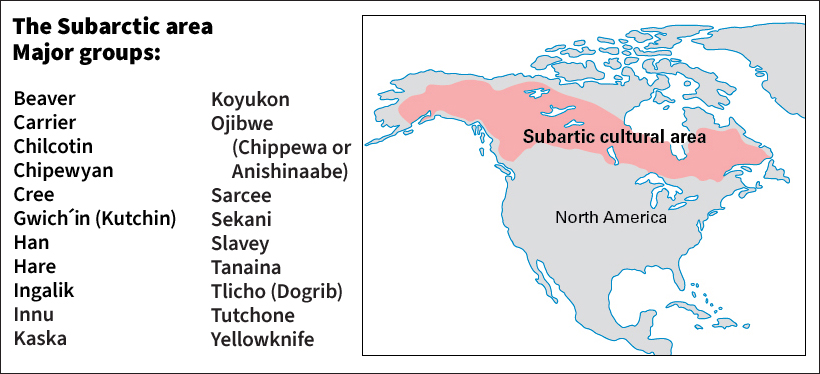Chippewa << CHIP uh wah >> form one of the largest Native American tribal groups in North America. They once lived in the forest country around the shores of Lake Superior. The American poet Henry Wadsworth Longfellow based many of the customs in his poem The Song of Hiawatha on the Chippewa. The Chippewa are also called the Anishinaabe, Anishinabe, Ojibwa, Ojibway, Ojibwe, or Otchipwe.

The Chippewa were skilled in fishing. They gathered in summer around the falls of Sault Ste. Marie to spear sturgeon. They also hunted in the forests and gathered wild plants, especially the wild rice of the lake country. They used much of the plentiful birchbark in the northern forests to cover their wigwams and make beautiful bark canoes, boxes, dishes, and baskets.
Many Chippewa belonged to a secret religious organization, the Midewiwin Society. Members tried to gain long life by using herbs and magic. The priests kept records by scratching symbols on birchbark.
The Chippewa lived in isolated areas, and so they had few battles with white people. But they often fought the Sioux and the Fox tribes, especially over possession of wild-rice fields. During the 1800’s, the Chippewa ceded their tribal lands to the federal governments of Canada and the United States, and these governments established federal reservations for the tribe.
According to the 2020 U.S. census, there are about 100,000 Chippewa. About 65,000 live in Michigan, Minnesota, or North Dakota. The largest Chippewa communities are the Turtle Mountain Reservation in North Dakota and the Red Lake Reservation in Minnesota. But most Chippewa live outside reservations. Chippewa are employed in a wide range of occupations, including agriculture, the arts, and such professions as education, law, and medicine. Many make a living by hunting, trapping, lumbering, or working as guides. Chippewa people harvest much of the wild rice that is eaten in the United States.
See also Banks, Dennis; Baraga, Frederic; Grey Owl; Indigenous peoples of the Americas (Peoples of the Northeast); Indian wars (Conflicts in the Midwest).
